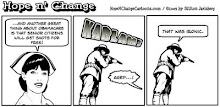If this article is not proof that we need to drill here and drill now, then I don't know what is!
OPEC Pushing to Cut Production, Drive Up Oil and Gasoline Prices
Tuesday, October 21, 2008
Just as Americans are finally beginning to reap the benefits of plunging gasoline prices — including more money in their pockets — OPEC is getting ready to squeeze them once again by cutting oil production and driving up prices to refineries.
The 13-nation global oil cartel — which includes Mahmoud Ahmadinejad's Iran and Hugo Chavez's Venezuela — will hold an emergency meeting in Vienna Friday to discuss the steep and rapid decline in oil prices.
"The era of cheap oil is finished," Iran's Oil Minister Gholamhossein Nozari boasted on Tuesday.
When asked what price Iran would want for its oil, Nozari declared, "The more the better."
"A few member nations have voiced their intentions of pushing for a cut in production, including Qatar, Iran, as well as OPEC's president Chekib Khelil, who said that output could be slashed by as much as 2 million barrels a day," analysts for Raymond James & Associates told MarketWatch.com.
When oil peaked at more than $147 a barrel in July, gas prices soared to above $5 a gallon in some parts of the U.S., and Americans were forced to cut back on driving. With the price of oil at about $73 a barrel on Tuesday, pump prices have fallen to as low as $2.30 a gallon.
The price dip in oil — and gasoline — finally is working its way into the beleagured American economy, putting a few extra dollars in the hands of consumers just as the home heating and holiday shopping seasons begin.
Sam Gault, president of Gault Inc., a fifth-generation, family-owned oil business in Westport, Conn., said the drop in oil prices is helping his customers, his business and his community.
"Obviously a down market helps the consumer," Gault said. "When the price of oil is less, it’s a good thing for everyone. It's good for the consumer. It's good for us as an oil company. It just puts more disposable income back into the economy because it's not used for household expenses."
When oil costs more, Gault said, "people need to make different choices. But you have to heat your home."
OPEC, however, wants prices to climb — and quickly.
Khelil on Monday even urged non-OPEC oil producers, such as Russia, Mexico and Norway, to follow the cartel's lead and cut production, Reuters reported.
Such a coordinated move is sure to drive prices back up over $100 a barrel — and hit Americans where it hurts.
"OPEC doesn't care about anybody. They don't care about the United States. They don't care about our consumers," said Ross Dibono, executive director of the Pennsylvania Gasoline Retailers Association.
"They're very small countries that just happen to be sitting on an unlimited wealth of oil and they're going to extract as much out of the ground as they feel comfortable with," he said. "Why sell 200 gallons for $100 a barrel when you can sell 100 gallons for $200 a barrel?"
"Saudi Arabia doesn't care about you or me or anybody else," he said. "They've got a taste of the expensive barrel of oil."
Iran's oil minister told Reuters he would push to cut production by up to 2.5 million barrels per day.
Iran has taken a liking to astronomical oil prices, using its newfound wealth to fuel its nuclear program in defiance of the U.S. and the global community. But the country would need oil prices to stay above $85 per barrel to balance its books, according to a report released in August by the International Monetary Fund, the New York Times reported Wednesday.
Venezuela's capitalism-bashing Chavez has used his country's oil windfall to buy Russian weapons, going as far as to let the Russian navy practice in its waters. Russia reportedly is also helping Venezuela develop nuclear power.
Chavez said on Saturday that oil at $80 to $90 a barrel would be good enough to keep Venezuela going, Reuters reported, but analysts say the country has billions stashed away and will be able to withstand a price drop.
Gault, however, said the key to whether American consumers are once again going to have to worry about heating their homes and how far they drive is going to come down to one country.
"Its really going to come down to whether Saudi Arabia wants to cut production, because they're the ones that can afford to cut production," Gault said. "A lot of times the different members of OPEC wind up cheating on their quotas."
Tuesday, October 21, 2008
Subscribe to:
Post Comments (Atom)









No comments:
Post a Comment